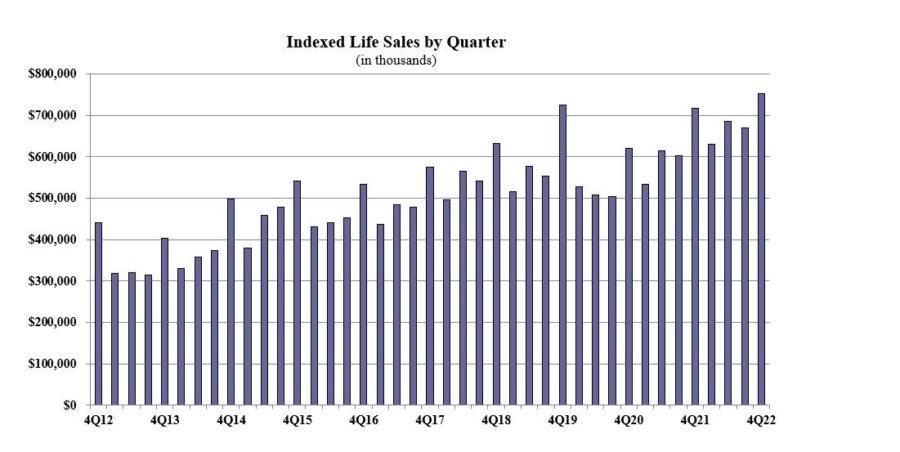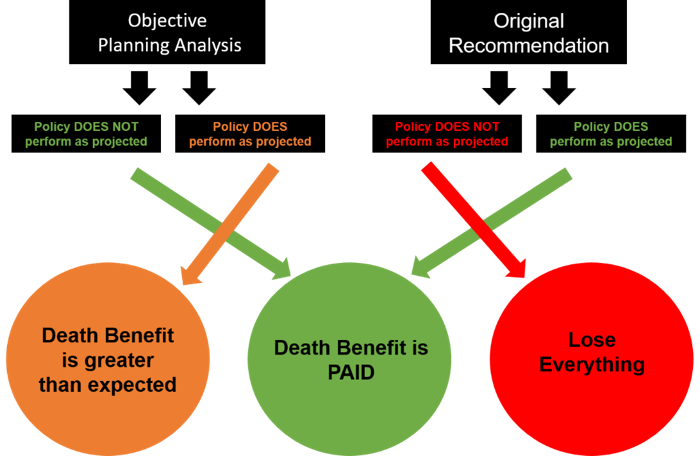All Categories
Featured
Table of Contents
1), frequently in an effort to beat their group standards. This is a straw guy argument, and one IUL individuals enjoy to make. Do they compare the IUL to something like the Vanguard Total Amount Stock Market Fund Admiral Show no tons, a cost ratio (EMERGENCY ROOM) of 5 basis points, a turn over ratio of 4.3%, and an exceptional tax-efficient record of circulations? No, they contrast it to some awful proactively taken care of fund with an 8% lots, a 2% EMERGENCY ROOM, an 80% turnover ratio, and an awful record of short-term resources gain circulations.
Shared funds frequently make yearly taxed distributions to fund proprietors, even when the value of their fund has dropped in value. Shared funds not just call for income reporting (and the resulting annual taxation) when the shared fund is increasing in worth, however can also impose income tax obligations in a year when the fund has actually gone down in value.
That's not just how common funds function. You can tax-manage the fund, harvesting losses and gains in order to lessen taxed circulations to the investors, however that isn't in some way going to change the reported return of the fund. Only Bernie Madoff types can do that. IULs stay clear of myriad tax obligation traps. The ownership of shared funds may need the shared fund proprietor to pay approximated tax obligations.

IULs are easy to position to ensure that, at the owner's fatality, the recipient is not subject to either income or inheritance tax. The very same tax obligation reduction methods do not function virtually also with shared funds. There are numerous, usually pricey, tax obligation catches related to the moment acquiring and selling of common fund shares, catches that do not put on indexed life insurance policy.
Possibilities aren't extremely high that you're going to be subject to the AMT due to your mutual fund distributions if you aren't without them. The remainder of this one is half-truths at ideal. While it is real that there is no income tax due to your successors when they inherit the profits of your IUL plan, it is likewise real that there is no income tax due to your successors when they inherit a mutual fund in a taxable account from you.
Iul Good Or Bad
The federal inheritance tax exception restriction is over $10 Million for a couple, and growing yearly with inflation. It's a non-issue for the huge majority of medical professionals, a lot less the rest of America. There are far better methods to prevent estate tax obligation issues than acquiring investments with low returns. Common funds might trigger income taxes of Social Protection advantages.

The development within the IUL is tax-deferred and may be taken as tax obligation free earnings by means of loans. The plan owner (vs. the mutual fund manager) is in control of his or her reportable revenue, hence allowing them to lower or even eliminate the tax of their Social Safety and security benefits. This is great.
Right here's an additional minimal problem. It's real if you buy a shared fund for claim $10 per share prior to the distribution day, and it disperses a $0.50 distribution, you are then going to owe tax obligations (possibly 7-10 cents per share) despite the truth that you haven't yet had any gains.
In the end, it's truly concerning the after-tax return, not how much you pay in taxes. You're also possibly going to have more money after paying those taxes. The record-keeping demands for owning mutual funds are dramatically a lot more intricate.
With an IUL, one's records are kept by the insurance firm, duplicates of yearly statements are sent by mail to the proprietor, and circulations (if any) are amounted to and reported at year end. This is likewise sort of silly. Naturally you ought to maintain your tax records in case of an audit.
Universal Life Rates
Hardly a factor to buy life insurance coverage. Common funds are frequently part of a decedent's probated estate.
Additionally, they undergo the hold-ups and expenses of probate. The earnings of the IUL plan, on the other hand, is constantly a non-probate circulation that passes beyond probate straight to one's called recipients, and is consequently exempt to one's posthumous financial institutions, undesirable public disclosure, or comparable hold-ups and costs.
Medicaid incompetency and lifetime income. An IUL can provide their owners with a stream of income for their entire lifetime, regardless of how lengthy they live.

This is beneficial when arranging one's events, and converting assets to earnings prior to an assisted living facility confinement. Common funds can not be converted in a similar fashion, and are usually thought about countable Medicaid assets. This is one more silly one promoting that bad people (you recognize, the ones that need Medicaid, a federal government program for the bad, to spend for their assisted living facility) need to use IUL as opposed to common funds.
Index Universal Life Insurance Reddit
And life insurance policy looks awful when compared rather versus a pension. Second, people who have money to purchase IUL over and beyond their pension are mosting likely to need to be horrible at taking care of cash in order to ever before get approved for Medicaid to spend for their nursing home costs.
Persistent and terminal disease motorcyclist. All policies will certainly enable a proprietor's easy accessibility to cash from their policy, typically forgoing any abandonment charges when such people suffer a significant ailment, need at-home treatment, or come to be restricted to a retirement home. Common funds do not give a similar waiver when contingent deferred sales charges still put on a common fund account whose proprietor needs to market some shares to money the expenses of such a keep.
Survivorship Life Insurance Quote
Yet you obtain to pay more for that benefit (biker) with an insurance plan. What a large amount! Indexed global life insurance policy provides fatality advantages to the recipients of the IUL owners, and neither the proprietor nor the recipient can ever shed money due to a down market. Common funds supply no such assurances or death advantages of any type of kind.
I absolutely don't need one after I reach financial freedom. Do I want one? On average, a purchaser of life insurance coverage pays for the true expense of the life insurance coverage benefit, plus the costs of the plan, plus the profits of the insurance coverage business.
Maximum Funded Insurance
I'm not entirely sure why Mr. Morais tossed in the entire "you can't shed cash" again below as it was covered quite well in # 1. He simply wanted to repeat the very best selling factor for these things I expect. Again, you don't shed small dollars, however you can shed real bucks, in addition to face significant chance cost because of reduced returns.

An indexed global life insurance policy policy owner might exchange their policy for a completely different plan without setting off income taxes. A shared fund proprietor can stagnate funds from one common fund firm to an additional without offering his shares at the former (thus setting off a taxable occasion), and buying brand-new shares at the last, often based on sales fees at both.
While it holds true that you can trade one insurance coverage for one more, the reason that individuals do this is that the very first one is such a horrible policy that even after purchasing a brand-new one and undergoing the very early, unfavorable return years, you'll still appear ahead. If they were marketed the right policy the initial time, they should not have any kind of desire to ever before exchange it and go with the early, negative return years once more.
Latest Posts
Equity Indexed Universal
Iul Explained
Universal Life Insurance For Seniors